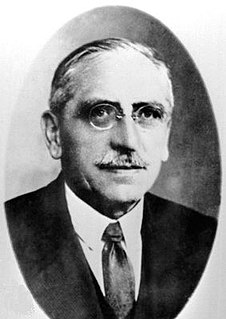A Quote by Thomas B. Macaulay
In Plato's opinion, man was made for philosophy; in Bacon's opinion, philosophy was made for man.
Related Quotes
The modern habit of saying "This is my opinion, but I may be wrong" is entirely irrational. If I say that it may be wrong, I say that is not my opinion. The modern habit of saying "Every man has a different philosophy; this is my philosophy and it suits me" – the habit of saying this is mere weak-mindedness. A cosmic philosophy is not constructed to fit a man; a cosmic philosophy is constructed to fit a cosmos. A man can no more possess a private religion than he can possess a private sun and moon.
Experience has repeatedly confirmed that well-known maxim of Bacon's that 'a little philosophy inclineth a man's mind to atheism, but depth in philosophy bringeth men's minds about to religion.' At the same time, when Bacon penned that sage epigram... he forgot to add that the God to whom depth in philosophy brings back men's minds is far from being the same from whom a little philosophy estranges them.
My curiosity, alas, is not the kind that can be satisfied by objective knowledge. Plato said that opinion is worthless and that only knowledge counts, which is a neat formulation. ... But melancholy Danes from the northern mists understand that opinion is all there is. The great questions transcend fact, and discourse is a process of personality. Knowledge cannot respond to knowledge. And wisdom? Is it not opinion refined, opinion killed and resuscitated upward? Maybe Plato would have agreed with this.
In Philosophy, the contemplations of man do either penetrate unto God, or are circumferred to Nature, or are reflected and reverted upon himself. Out of which several inquiries there do arise three knowledges, Divine Philosophy, Natural Philosophy, and Human Philosophy or Humanity. For all things are marked and stamped with this triple character of the power of God, the difference of Nature and the use of Man.
There are two threats to reason, the opinion that one knows the truth about the most important things and the opinion that there is no truth about them. Both of these opinions are fatal to philosophy; the first asserts that the quest for truth is unnecessary, while the second asserts that it is impossible. The Socratic knowledge of ignorance, which I take to be the beginning point of all philosophy, defines the sensible middle ground between two extremes.
The scriptures, for example, discredit an ancient philosophy that has come back into vogue in our day-the philosophy of Korihor that there are no absolute moral standards, that "every man prospers according to his genius, and that every man conquers according to his strength; and whatsoever a man does is no crime" and "that when a man is dead, that is the end thereof".
A writer must always try to have a philosophy and he should also have a psychology and a philology and many other things. Without a philosophy and a psychology and all these various other things he is not really worthy of being called a writer. I agree with Kant and Schopenhauer and Plato and Spinoza and that is quite enough to be called a philosophy. But then of course a philosophy is not the same thing as a style.
One or another man, liberated or cursed, suddenly sees-but even this man sees rarely-that all we are is what we aren't, that we fool ourselves about what's true and are wrong about what we conclude is right. And this man, who in a flash sees the universe naked, creates a philosophy or dreams up a religion; and the philosophy spreads and the religion propagates, and those who believe in the philosophy begin to wear it as a suit they don't see, and those who believe in the religion put it on as a mask they soon forget.

































